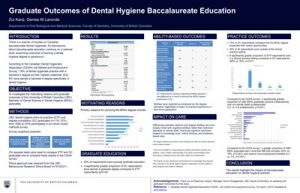It is hard to believe 50 years has passed since the inaugural dental hygiene class commenced at the University of British Columbia’s Faculty of Dentistry. This year, 2018, marks a golden milestone. Come celebrate with us—the Faculty, the university and the province—as we honour the history and aspire for the future of dental hygiene education at UBC. Take a trip through the following timeline to discover how it has unfolded in these first 50 years.

1968
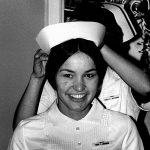
UBC Faculty of Dentistry launches a two-year dental hygiene diploma program. It is the fifth faculty of dentistry in Canada to do so after the University of Toronto (1950), Dalhousie University (1961), University of Alberta (1961) and University of Manitoba (1963). Unlike the other universities, UBC requires all first-year UBC students to complete one year of university prerequisite courses before admission to individual programs. Twenty students are admitted to the first class of the program, which is accredited by the Commission on Dental Accreditation of Canada (CDAC). Founding faculty members include: Dr. Douglas Yeo, assistant dean and administrator of the program; Margaret Robinson, program director from 1968 to 1970; and Joan Voris, program director from 1971 to 1986. (See sidebar for additional faculty in leadership roles.)
1970

First dental hygiene diploma class graduates.
The dental hygiene clinic is located on the first floor of the John B. Macdonald Building. This is an isolated location away from the main clinic for dental students, which is above on the main floor. Despite the separation, creative ideas to combine dental hygiene and dental students in classes and the main floor clinic help establish a solid tradition of the two groups learning and practising together.

1978 – 1982
Recognizing a need for advanced education in dental hygiene to fulfill requirements for dental hygiene educators, public health supervisors and researchers, the Faculty of Dentistry starts discussions to convert UBC’s diploma program into a degree program. Two proposals are presented to the Faculty Council, but neither are approved.
1986

UBC’s dental hygiene diploma program is discontinued following the university’s 1984 change of mission to offer only undergraduate degree programs. Subsequently, several community colleges in British Columbia (Vancouver Community College, 1986; New Caledonia in Prince George, 1989; Camosun in Victoria, 1989; and Vancouver Island University in Nanaimo, 2006) begin dental hygiene diploma programs, maintaining prerequisite transfer courses.
1990 – 1991
BC Dental Hygienists’ Association lobbies the UBC Faculty of Dentistry for a degree-completion opportunity for practising dental hygienists with a dental hygiene diploma. This coincides with UBC’s push for faculties to expand education program opportunities for women and to increase the number of programs that are offered. The proposed degree-completion program in dental hygiene receives approval of the Faculty Council and UBC Senate. Curriculum is developed collaboratively by Faculty of Dentistry experts in dental sciences and a broad representation of dental hygiene leaders in both Canada and the US.
1992
UBC’s Bachelor of Dental Science Program (Degree Completion) in dental hygiene starts, with two full-time and three part-time students learning on campus. Enrolment is limited at the request of the dean, to allow time to learn what impact this new program will have on Faculty resources. The founding program director is professor Bonnie Craig (1992-2015). Entrance requirements include one year of university prerequisite courses and a two-year dental hygiene diploma from an accredited program. The curriculum focuses on enhancing academic background, including dental, dental hygiene and social sciences. Clinic sessions are not included in the curriculum because students are already registered to practise, thus deemed competent. Some classes, such as microbiology, periodontology, oral medicine and oral pathology, are taken with dental students.
1995
UBC administration encourages faculties with small programs to increase enrolment or risk being discontinued. The dean of Dentistry, Dr. Ed Yen, asks the dental hygiene program director to explore possibilities for increasing enrolment in the dental hygiene program. No funds are available from UBC or the Faculty for this purpose.
1996
First dental hygiene degree completion class graduates, earning a Bachelor of Dental Science in Dental Hygiene degree, or BDSc (DH).
1999

Having a goal of increasing enrolment, no funding, and a revised dental curriculum that eliminated the class-based courses taken with dental students, Dental Hygiene submits a proposal to Distance Education for funds to create the first online course. Dental Hygiene, in competition with other UBC initiatives, is approved for reformatting Oral Pathology to an online format.
2001
Faculty of Dentistry and UBC Senate approve a strategy to increase enrolment by offering several pathway options for admission, tailored to the variety of CDAC-accredited dental hygiene diploma program graduates. An international category for non-North American degree completion students is also approved. Demand for admission in all options increases immediately. The UBC Registrar requests that the program name be changed from Bachelor of Dental Science Program to Dental Hygiene Degree Program for clarity. Additionally, the Faculty Council approves, in principle, a four-year entry-to-practice (ETP) option for students with no prior dental hygiene education. Funding applications for online course development, one course at a time, continue annually over a five-year period. Each proposal is successful, eventually resulting in all degree completion courses being online
2006
All degree-completion courses are offered exclusively through Distance Education. The decision to offer online courses only, while containing costs for the Faculty, results in the most flexible and accessible dental hygiene learning opportunities available across Canada and globally. Enrolment exceeds expectations, with students from all over North America. Additionally, after much deliberation, the entry-to-practice (ETP) option is approved by Faculty Council and UBC Senate.
2007
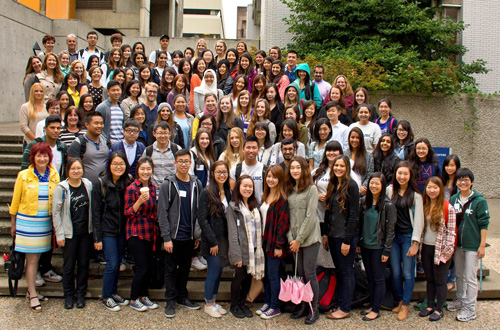
First ETP class is admitted to undertake four years of full-time study. ETP provides a science degree and preparation for registration to practise as a dental hygienist. The first program of its kind in Canada, students could be admitted after secondary school or with previous post-secondary credits. ETP curriculum prepares dental hygienists for enhanced community health roles, and many students know, when starting, they will eventually pursue graduate studies.
2008
As of 2008, nine degree-completion graduates had graduated with a master’s degree in Science (Dental Science), Education or Health Administration; two of them are now PhD candidates at UBC. Also in that year, 11 dental hygiene graduates are studying in master’s programs at UBC, and at the universities of Toronto, Alberta and Idaho. Four other graduates are applying for programs in Science (UBC), Public Health (SFU), Distance Education (Athabasca) and Education (UBC).
2011
Four years of undergraduate studies in science combined with specific education to become a dental hygienist comes to fruition as the first class in the ETP option graduates, receiving the BDSc (DH) degree as their first dental hygiene credential.
2015
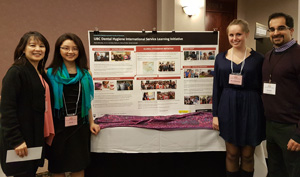
Committed to fostering global citizenship, the Dental Hygiene Degree Program commences dental hygiene international service-learning experiences, beginning in Vietnam.
Working with various local health care professionals, fourth-year students and faculty provide instruction and preventive care for oral cancer patients, conduct oral cancer screenings, present seminars to students and health care professionals at hospitals and universities, and provide oral hygiene care to children at orphanages.
2016

Continuing its leadership position in dental hygiene education in Canada, UBC’s Dental Hygiene Degree Program is the first to integrate the newly published Canadian Competencies for Baccalaureate Dental Hygiene Programs.
The Faculty document is augmented by adding “Scientific Investigation” as an additional competency students are expected to demonstrate.
Also, in collaboration with UBC Health, the ETP option begins to develop, with 11 other health science programs on the UBC campus, interprofessional learning opportunities that are integrated in curriculum. Subjects include integrated ethics, e-Health and Indigenous cultural safety.
2018
A UBC BDSc (DH) graduate-outcomes study is published. Thirty percent of graduates from ETP and degree-completion options have pursued graduate education (dental and craniofacial sciences, adult education, public health, business administration).Forty-five percent of graduates are working outside of the private clinical practice setting (education, public health, administration, industry, research).UBC graduates are practising in diverse settings and adopting leadership roles in society. View the poster from the study here >>
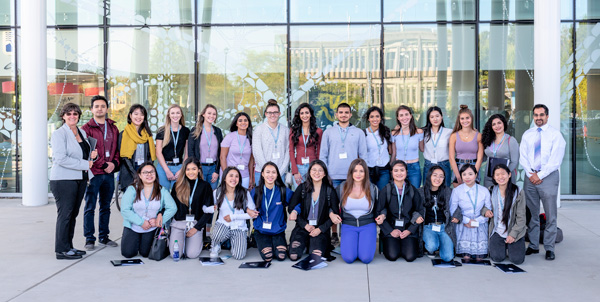
Thirty-nine new dental hygiene students joined the Faculty of Dentistry in the BDSc (DH) Class of 2022. The class is composed of 26 in the entry-to-practice option who study on campus (23 of whom are pictured below on the first day of class, September 4, 2018) and 13 degree-completion students who study online.
The Faculty of Dentistry is proud of all its dental hygiene graduates: 328 Diploma in Dental Hygiene alumni and 515 Bachelor of Dental Science in Dental Hygiene alumni (350 degree-completion and 165 ETP) to date.
UBC looks forward to continuing its leadership role in dental hygiene education in British Columbia, Canada and internationally.
Dental hygiene program directors:
- Margaret Robinson, 1968 to 1970
- Joan Voris, 1971 to 1986
- Prof. Bonnie J. Craig, 1992 to 2015
- Dr. Zul Kanji, 2015 to present
Online: 50 Years of Dental Hygiene Education at UBC
If you are a dental hygiene graduate from UBC and have memories or photos you’d like to share, send them to alumni@dentistry.ubc.ca, and if sharing on social media, use the hashtag #ubcdentalhygiene50
Content courtesy of Dr. Zul Kanji, director, Dental Hygiene Degree Program, and Prof. Bonnie J. Craig, professor emerita, UBC Faculty of Dentistry.

